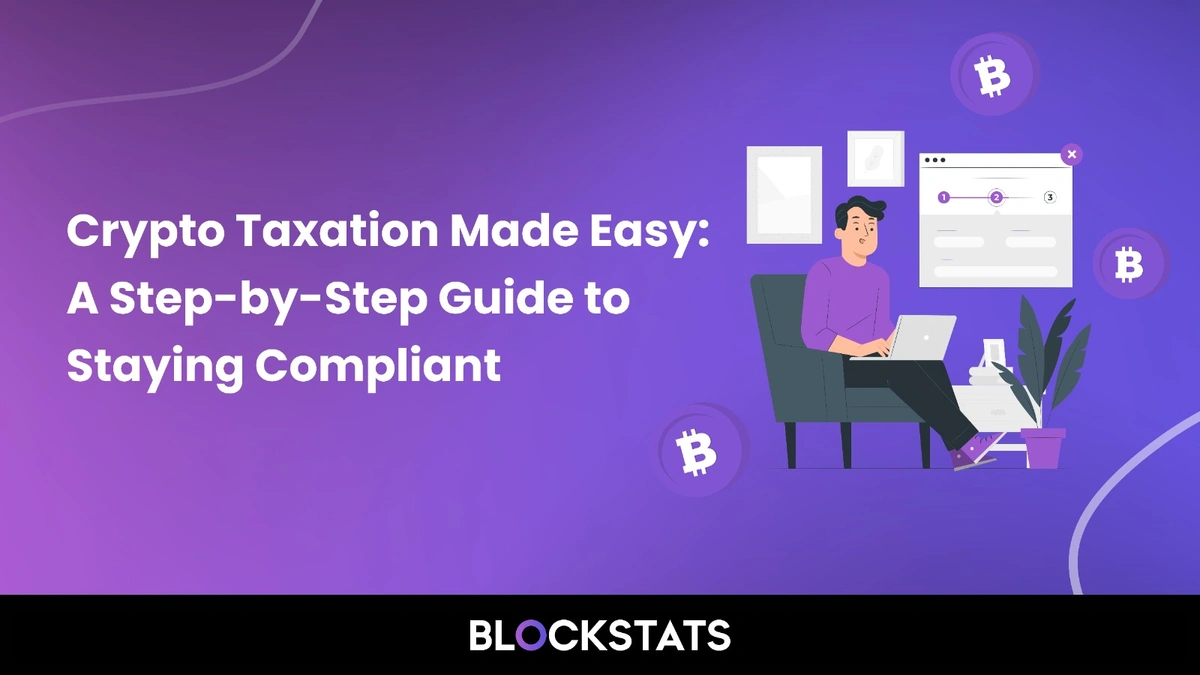Crypto Taxation Made Easy – A Step-by-Step Guide to Staying Compliant
Cryptocurrency has taken the world by storm, offering a new way to invest and transact. However, with its rise, governments are tightening regulations to ensure proper tax compliance. Whether you are a casual investor or an active trader, understanding crypto taxation laws is crucial to safeguard your investments. The Internal Revenue Service (IRS) in the U.S. and the Central Board of Direct Taxes (CBDT) in India have introduced strict tax regulations for crypto earnings, and failure to comply could lead to hefty fines or legal trouble.
At Blockstats, we will break down everything you need to know—from tax classification and reporting to strategies for legally reducing your tax burden. By the end, you will have a clear roadmap to filing your crypto taxes efficiently in 2025.
Step 1: How is Crypto Taxed in the U.S. and India?
Governments treat cryptocurrency as property rather than currency, meaning every transaction is subject to tax rules similar to stocks and real estate.
United States (IRS)
- Crypto is taxed as property, and every sale, trade, or conversion is a taxable event.
- Capital gains tax applies if you sell or trade crypto for a profit. Short-term gains (held under a year) are taxed at 10% to 37%, while long-term gains (held over a year) are taxed at 0% to 20%, depending on income brackets.
- Income tax applies if you receive crypto as salary, mining rewards, staking rewards, or airdrops.
India (CBDT & Income Tax Department)
- A flat 30% tax on crypto gains was introduced under the Finance Act 2022.
- A 1% TDS (Tax Deducted at Source) is applicable on every crypto transaction exceeding ₹50,000 per year.
- Losses from crypto trading cannot be offset against other income, making tax planning even more critical.
Key Takeaway: In both countries, crypto gains are taxable, and records of all transactions must be maintained for tax reporting.
Step 2: Maintain Accurate Records of All Transactions
The IRS and Indian tax authorities require detailed documentation of all crypto transactions. Keeping track of purchase dates, sale amounts, and transaction fees is essential for accurate tax filing.
What You Need to Record:
✔ Date of purchase and sale
✔ Crypto-to-fiat conversions (e.g., Bitcoin to USD or INR)
✔ Crypto-to-crypto trades (e.g., Ethereum to USDT)
✔ Staking and mining rewards
✔ Exchange transaction history
Using crypto tax software like Blockstats can automate this process and help you generate reports for tax filing.
Step 3: Identify Taxable vs. Non-Taxable Crypto Events
Knowing which crypto transactions are taxable and which are not is important for staying compliant—because not all crypto activities are taxed. Here is a breakdown for both U.S. and Indian tax laws:
Taxable Events:
-
Selling crypto for fiat (USD or INR)
-
Exchanging one cryptocurrency for another (like swapping BTC for ETH)
-
Earning crypto from mining, staking, or airdrops
-
Using crypto to purchase goods or services
Non-Taxable Events:
-
Buying crypto with fiat (holding BTC, ETH, etc.)
-
Transferring crypto between personal wallets
-
Receiving crypto as a gift (although gift tax rules may apply)
Pro Tip: Even if a transaction is non-taxable, keeping records can help during audits.
Step 4: Calculate Your Crypto Gains and Losses
Crypto capital gains or losses are determined by subtracting the purchase price (cost basis) from the selling price.
How to Calculate Capital Gains in the U.S.?
Capital Gain/Loss = Amount You Sold the Asset For - Amount You Paid to Buy It
Example: If you bought 1 BTC for $20,000 and sold it for $30,000, you have a $10,000 capital gain, which is taxable.
How to Calculate Cryptocurrency Tax in India
A flat 30% tax on profits applies. If you buy crypto for ₹2,00,000 and sell for ₹3,00,000, you owe ₹30,000 in taxes on your ₹1,00,000 profit.
Step 5: Report and File Crypto Taxes in the U.S. and India
Tax authorities now require crypto traders to declare their holdings during tax filings.
How to Report Crypto Taxes in the U.S.?
✔ Use IRS Form 8949 and Schedule D for capital gains.
✔ Report crypto income on Form 1040.
✔ Failure to report can result in penalties and audits.
How to Report Crypto Taxes in India?
✔ Declare crypto earnings under Income from Other Sources in the ITR filing.
✔ Deduct TDS (1%) from each transaction before reporting.
✔ No deductions for expenses or losses related to crypto trading.
Step 6: Legal Ways to Reduce Crypto Taxes
Reducing your crypto tax burden is possible with smart planning. Here are some strategies for both the U.S. and India:
U.S. Strategies
-
Long-Term Holding: Gains from crypto held for over a year are taxed at lower rates.
-
Tax-Loss Harvesting: Reduce your capital gains liability by selling assets that have decreased in value.
India Strategies
-
P2P Transactions: Some traders use peer-to-peer (P2P) trading to avoid TDS deductions.
-
Offshore Exchanges: Using foreign exchanges with different tax regulations may offer benefits, though compliance with FEMA rules is essential.
Step 7: Meet Tax Deadlines & Avoid Penalties
Missing tax deadlines can lead to audits and heavy penalties. Ensure you file on time and keep transaction history for future reference.
Tax Deadlines for 2025:
✔ U.S. (IRS) – April 15th, 2025
✔ India (CBDT) – July 31, 2025
Take Control of Your Crypto Taxes With Ease!
Crypto taxation is not avoidable anymore, but with proper record-keeping, reporting, and strategic planning, you can stay compliant while minimizing tax liabilities. Whether you are in the U.S. or India, understanding the tax rules will help you avoid legal trouble and maximize your crypto profits.
Need help tracking your crypto transactions?
Managing your crypto taxes does not have to be a daunting task. Fortunately, with Blockstats, you gain access to a robust, user-friendly platform designed to make crypto portfolio management and tax compliance effortless. By following the few simple steps, you can confidently meet your tax obligations while keeping your investment strategy on track. Stay ahead of the game with Blockstats and ensure your crypto journey remains secure and compliant.


